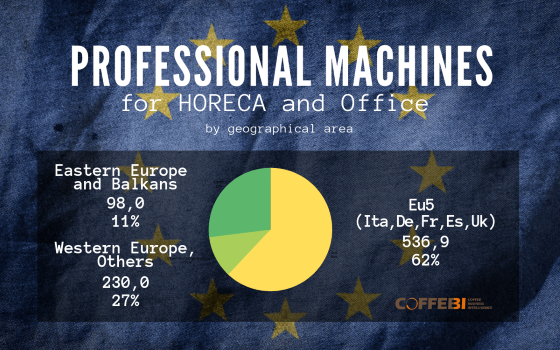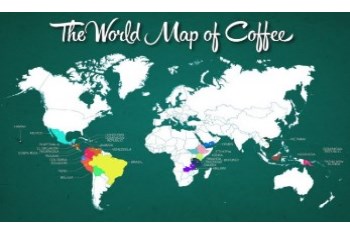The Professional machine market in the main European countries 2019
Professional machines in Europe
When you are looking for a good coffee the first thing you are likely to consider is the blend, , then, in order to ensure a good result, there is the need for a good coffee machine and in some cases, even for an experienced barista.
The coffee machine is the tool that allows the blend, to become a drink that can be enjoyed and enhances its quality.
There are many types of machines, and some users have even been passionate enough to catalogue them by listing the various ways of making coffee.
Leaving aside the ways one would make coffee at home and focusing on the more professional aspects, we can group the machines into three macro-categories: expresso, filter and instant/soluble.
The differences come from the technology involved. The coffee is obtained by passing the mixture through hot water under pressure. In the first case, coffee is obtained by passing the blend through hot water under pressure. In other cases, hot water and coffee passes through a filter, or simply coffee is mixed with hot water.
One method is not necessarily better than another. The end result is simply a different coffee: creamier in the case of espresso, less creamy and longer in other cases.
The greater or lesser use of a machine depends on the type of coffee drunk in a particular country. In Italy and France, for example, espresso is mostly preferred , but in other countries of central-northern Europe,
filtered coffee is predominant. In others, such as in Russia, England and Spain, there is a high percentage of instant coffee consumption.
In Europe, in recent years, the preference for espresso has increased, whereas demand for instant and filtered coffee has been reduced.
With regard to filtered coffee, machines that allow the use of freshly ground blends are growing in popularity. The use of filtered coffee is also linked to new cold preparation trends such as “cold brew”.
Read also "The European market for professional espresso coffee machines 2019" - Part 1 and Part 2
The Professional machine market in the main European countries
Germany is the largest market in Europe with a value of 227.5 million euros.
This value is generated by the large number of machines sold in the country and by the highest average price per unit, as most models are fully automatic.
There is strong competition in the country and widespread assistance and high performance of coffee machines is required.

On the other hand, Italy is the market with the largest number of traditional espresso models. The producers mainly export their machines abroad and the domestic market has a sell-in value of 60.7 million euros.
Price competition and the demand for product quality make the Italian market one of the most competitive in Europe.
In France, the coffee machine market is divided between traditional and automatic models. The value is around 72 million euros (sell-in).
The automatic models are used in offices, in coffee shops of main cities and above all in the north of the country.
Traditional models, thanks to local manufacturing, are also widespread in the suburbs. These models are preferred by the new cafeterias or the large centers that offer blends of different selected origins and organic options.
Spain is the country that has experienced the largest increase in the market in recent years. Traditional espresso models have a larger market share compared to other machines. However, average machine prices are among the lowest in Europe.
In the UK, despite concerns about Brexit, the market is still growing, thanks to the opening of new cafes and an increase in the use of automatic machines in the office. In terms of value (132.5 million euros) it is the second largest market in Europe and has an average price for machines which ranks among the highest in Europe.



